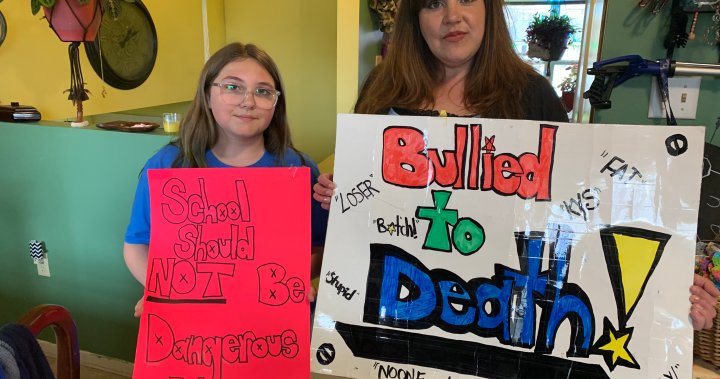Two parents in Nova Scotia are expressing frustrations regarding what they say is a lack of support for students who are at risk of physical violence and bullying in public schools.
Laura Pellow said her son, who’s in his first year of junior high, was allegedly assaulted by a group of students during school hours last month.
“They broke his collar bone in about two places and they video (recorded) it,” she said during an interview on Thursday.
“I know that the school administration wants to support my son, but they do not have the education and the resources. They are failing my son.”
Pellow said that her son, who experiences several learning disabilities, initially didn’t share with his mother what had happened following the incident. After a few days, he finally revealed what had occurred and provided a statement to the police.
She said harassment toward her son then ensued online following the alleged incident. Pellow doesn’t want to say where her son goes to school over fears for his safety.

“There was lots of bullying on TikTok and online with my son. And then over the week, he didn’t go to school (as he) was recovering … and I find out that he was bullied all year long,” she said.
“He was so afraid to tell me as he thought the problem would get worse.”
She said the province’s education system doesn’t have adequate resources to support students like her son, therefore putting him at an increased risk.
“Six weeks ago, it was my son’s collar bone. Every day I think about what could happen next to him. It scares me to my core, and it should scare every other parent,” Pellow said.
“I’m just really confused as to why the government isn’t moving faster … I’m terrified to send my kids to high school.”
Pellow said she hopes collaboration can be strengthened between parents and the provincial government regarding this issue so kids can feel properly supported and safe from harm in a school environment.
Breaking news from Canada and around the world
sent to your email, as it happens.
“We all want the best for our children. But what is it going to take to make the change?” she asked.
Pellow said she was “baffled” at the school’s response to her son suffering a broken collarbone at school, saying she was told by the school’s principal that the school simply doesn’t have the resources to offer proper support.
“I just felt like it was swept under the table like it doesn’t matter because there’s nothing they can do,” she said.
“People need to be very aware that violence is in the schools, it’s very bad, and if we don’t start talking and coming together then we are never going to change things. We’re just not.”
Student tells her story
Kaiya Robicheau, a 12-year-old junior high student, said she hasn’t been in school since January following repeated instances of bullying. She said she feels “let down” by the lack of support she’s received from her school administrators.
“Schools say that it is a safe space but it’s not. They don’t deal with the bullying at all,” she said during an interview with Global News on Thursday.
The seventh-grade student said she was physically attacked by a group of students in a movie theatre bathroom during an outing with her father and younger sister. She said the students had been bullying her at school for about two years.
She said a student who shared a locker above hers would physically attack her whenever she attempted to get her school supplies.
Kaiya Robicheau holds up another one of her signs that she brought to protest outside of her junior high school last week.
Amber Fryday
“I have to crouch down under her to get my binder for class. She would always push me, pull my hair, slap me, punch me, pinch me, yank my hair … she would do anything she could just to get physical,” she explained.
She said she’s since started homeschooling for the time being and it’s improved her ability to focus on her studies.
“Most of my marks have gone up about 10 per cent,” she said.
‘I’m terrified to send her to school’
Danielle Robicheau, the student’s mother, said it’s always been the same group of students harassing her daughter. Despite ongoing conversations with the school, the kids are yet to be suspended or face any punishment for their actions.
“There’s zero consequences for the bullies by the administrators,” she said.
“The parents don’t even know. The reports have not been filed.”
Robicheau said she’s yet to see any incidents related to the harassment her daughter has experienced at school recorded on PowerSchool — an online reporting tool for students, parents, and educators.
“I’m terrified to send her to school,” she said.
“She was jumped in a bathroom. They (students) planned it, recorded it, beat her up, and rapidly spread it across social media … there are Instagram groups that are made for school fights.”
Last week, Robicheau and her daughter held a small anti-bullying protest outside of her daughter’s junior high to draw awareness to what she’s experienced.
Robicheau said she’s had about 20 parents inform her that their children have stopped attending schools in the Halifax area due to a lack of action being taken to prevent bullying.
“They’re sick with physical illness, nausea, upset stomach, headaches, anxiety, and they don’t go to school because the environment is not conducive to learning,” she said.
She said the principal at her daughter’s school needs to be accountable, along with the responsible students, before she feels comfortable allowing her daughter to return to attending classes in person.
“For me to get her back there, someone needs to address this situation. Head on,” Robicheau said.
“There’s zero tolerance for bullying, that’s what they say in school. There is pink day. It’s one day. You can all wear your pink shirt today and then the rest of the year you can bully each other, apparently. There’s a lot of tolerance for bullying,” she continued.
“We’re supposed to trust that our children are safe in school, and I think a lot of us are feeling like they are not. If we start talking to the children, we’ll hear the children say they’re not,” she said.
Department of Education responds
In an email statement to Global News on Thursday, a spokesperson for Nova Scotia’s Department of Education said that bullying is considered an “unacceptable behaviour” in the provincial school code of conduct and that it should be responded to immediately.
The department listed several procedures that schools have in place to address instances of bullying.
“Within our schools there are many strategies used, supporting resources, and skills taught in response to unacceptable behaviours, including restorative practices, mediation, coaching to develop new behaviours, referrals to appropriate specialists and in-school and out-of-school suspensions,” the statement read.
“Research tells us that one of the best ways to prevent bullying is to develop in students an understanding of how to express their feelings, get along with classmates and solve problems.”
The province added that the code of conduct is actively under review in collaboration with the Nova Scotia Teachers Union and the Public-School Administrators Association of Nova Scotia.
Global News reached out to the Halifax Regional Centre for Education but didn’t receive a response in time for publication.
— with files from Amber Fryday





